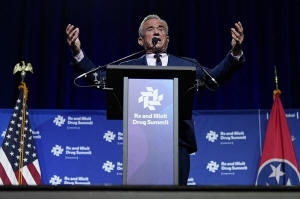RFK Jr. recounts heroin addiction and spiritual awakening, urges focus
on prevention and community
[April 25, 2025]
By TRAVIS LOLLER
NASHVILLE, Tenn. (AP) — U.S. Health Secretary Robert F. Kennedy Jr. told
a personal story of his own heroin addiction, spiritual awakening and
recovery at a conference on drug addiction Thursday and emphasized that
young people need a sense of purpose in their lives to prevent them from
turning to drugs.
Kennedy called addiction “a source of misery, but also a symptom of
misery." In a speech that mentioned God more than 20 times, he pointed
to his own experience feeling as though he had been born with a hole
inside of himself that he needed to fill.
“Every addict feels that way in one way or another — that they have to
fix what's wrong with them, and the only thing that works are drugs. And
so threats that you might die, that you're going to ruin your life are
completely meaningless,” he said.
Speaking to about 3,000 people at the Rx and Illicit Drug Summit in
Nashville, Tennessee, Kennedy did not address recent budget and
personnel cuts or agency reorganizations that many experts believe could
jeopardize public health, including recent progress on overdose deaths.
Kennedy drew cheers when he said that we need to do “practical things”
to help people with addictions, like providing them with Suboxone and
methadone. He also said there should be rehabilitation facilities
available for anyone who is ready to seek help. But he focused on the
idea of prevention, signaling his view of addiction as a problem fueled
by deteriorating family, community and spiritual life.

“We have this whole generation of kids who’ve lost hope in their
future,” he said. “They’ve lost their ties to the community.”
Kennedy said policy changes could help reestablish both of those things.
Though Kennedy offered few concrete ideas, he recommended educating
parents on the value of having meals without cellphones and providing
opportunities for service for their children.
The best way to overcome depression and hopelessness, he said, is to
wake up each morning and pray “please make me useful to another human
being today. ”
He suggested that cellphones are a pernicious influence on young people
and that banning them in schools could help decrease drug addiction. He
cited a recent visit to a Virginia school that had banned cellphones,
saying that grades were up, violence was down and kids were talking to
one another in the cafeteria.

[to top of second column]
|

Health and Human Services Secretary Robert F. Kennedy Jr. speaks at
the Rx and Illicit drug Summit, Thursday, April 24, 2025, in
Nashville, Tenn. (AP Photo/George Walker IV)
 Kennedy told attendees that he was
addicted to heroin for 14 years, beginning when he was a teenager.
During those years, he was constantly making promises to quit, both
to himself and to his family.
“I didn’t want to be someone who woke up every morning thinking
about drugs," he said, noting that one of the worst parts of
addiction was his total “incapacity to keep contracts with myself."
Kennedy said he eventually stumbled upon a book by Swiss
psychiatrist Carl Jung that claimed people who believed in God got
better faster and had more enduring recoveries, so he worked to
rekindle his faith and started attending 12-step meetings.
Kennedy was interrupted several times by hecklers shouting things
like, “Believe science!” He has been heavily criticized by
scientists and public health experts for pushing fringe theories
about diet, vaccines, measles and autism, among other things.
One heckler was escorted out of the ballroom with a raised middle
finger. Without responding directly to the hecklers, Kennedy said
that he tries to learn from every interaction, even with people who
give him the finger because they don't like his driving.
“God talks to me most through those people,” he told the group.
University of Washington researcher Caleb Banta-Green was among
those escorted out after he stood up and shouted, "Believe science!
Respect spirituality! Respect choice! Respect government workers!”
“Spirituality is an essential part of recovery for some people; 12
step works great for the people it works for, however, it should
never be mandated,” Banta-Green said in an email after the program.
He added, “We have decades of science-based interventions that are
proven effective for supporting recovery and reducing death from
substance use disorder. The problem we have is massive
underfunding."
___
AP Medical Writer Carla K. Johnson in Washington state contributed.
All contents © copyright 2025 Associated Press. All rights reserved |